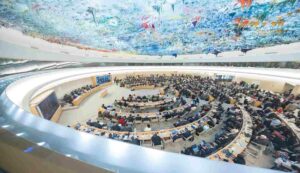WHO members vote for a global agreement to prevent future pandemics
Geneva: A resolution urging the formation of a worldwide agreement to avoid future pandemics was approved by World Health Organization (WHO) members.

On May 20, the World Health Assembly’s full plenary will examine the pandemic accord and the resolution urging its approval. According to a WHO news release, a High-Level portion with remarks from the heads of state of many countries will immediately follow.
Following more than three years of negotiations by nations during the COVID-19 pandemic to draft the world’s first such treaty to address the gaps and injustices in avoiding, preparing for, and reacting to pandemics, the resolution was approved.
“This watershed agreement was adopted under Article 19 of the WHO Constitution,” the WHO said in a news statement. In order to prevent pandemics from happening in the first place and to better react in the case of a future pandemic crisis, it seeks to strengthen collaboration and cooperation among nations, international organizations such as WHO, civil society, the commercial sector, and other stakeholders.
Tedros Adhanom Ghebreyesus, the director-general of the World Health Organization, commended member nations for their decision to unite in the wake of COVID-19 in order to better safeguard the globe against pandemics in the future.
In a news release, Ghebreyesus said, “Governments from all over the world are making their countries, and our interconnected global community, more equitable, healthier and safer from the threats posed by pathogens and viruses of pandemic potential.”
“I commend the Member States of WHO for their decision to unite in the wake of COVID-19 in order to better safeguard the globe from pandemics in the future. Their efforts to create this international agreement will guarantee that nations collaborate more effectively, more quickly, and more fairly in order to avert and address the next pandemic danger,” he said.
https://x.com/DrTedros/status/1924550242927518158
The resolution lays forth a number of actions to further global progress and be ready to implement the Pandemic Agreement. It involves forming an Intergovernmental Working Group (IGWG) to design and negotiate an appendix to the Agreement to create a Pathogen Access and Benefit Sharing system (PABS).
The outcome of this procedure will be taken into account in the World Health Assembly the following year. The Pandemic Agreement will be available for signing and ratification consideration, including by national legislative bodies, after the Assembly’s adoption of the PABS appendix. The Agreement is set to come into effect upon 60 ratifications.
Additionally, Member States directed the IGWG to take action to enable the establishment of the Global Supply Chain and Logistics Network (GSCL) and the Coordinating Financial Mechanism for pandemic prevention, preparedness, and response in order to “enhance, facilitate, and work to remove barriers and ensure equitable, timely, rapid, safe, and affordable access to pandemic-related health products for countries in need during public health emergencies of international concern, including pandemic emergencies, and for prevention of such emergencies.”
The WHO said in a press release that “pharmaceutical manufacturers who are part of the PABS system will be instrumental in providing fair and prompt access to pandemic-related health products by providing WHO with ‘rapid access targeting 20 per percent of their real time production of safe, quality and effective vaccines, therapeutics, and diagnostics for the pathogen causing the pandemic emergency.'” With special attention to the requirements of developing nations and those aided by the GSCL, the distribution of these items to nations will be based on public health risk and need.
In order to strengthen international regulations to more effectively identify, prevent, and react to outbreaks, nations last year agreed to revisions to the International Health Regulations, which are in line with the Pandemic Agreement.
Tedros Adhanom Ghebreyesus expressed gratitude to the Intergovernmental Negotiating Body (INB) Bureau for organizing and assisting in the Pandemic Agreement’s drafting and negotiation. Under the direction of Drs. Michael Ryan and Jaouad Mahjour, he commended the WHO Secretariat staff for their outstanding efforts in supporting the Bureau and Member States.
He said, “An immensely talented, experienced and driven WHO team was assembled to support the vision of governments to develop this historic Pandemic Agreement.”
“This group of individuals, representing so many countries and regions of the world, deserves enormous credit and thanks from the international community for what they have done to help make the world safer for future generations,” he said.